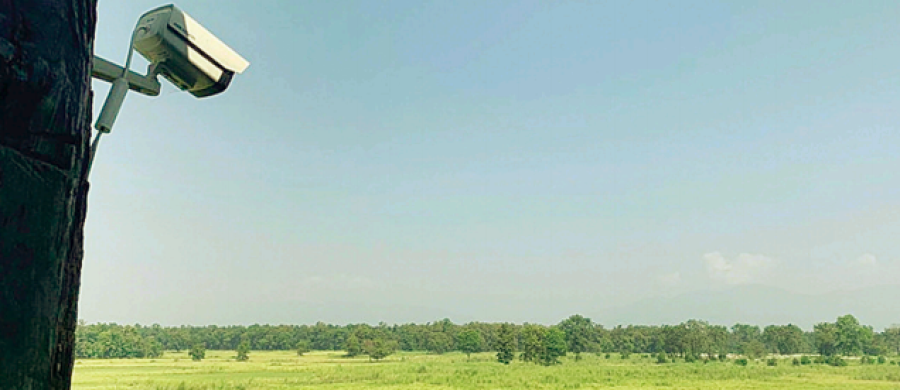National
National parks witnessed concerning rise in illegal activities during lockdown
Major protected areas have seen hundreds of people trespassing into protected areas, wildlife poaching and illegal logging.
Chandan Kumar Mandal
Nepal’s protected areas witnessed a significant rise in illegal activities as the country was in the midst of the Covid-19 pandemic-caused lockdown.
National parks and protected areas, mainly in low-lying Tarai districts, recorded a rise in cases such as trespassing into core park areas, wildlife poaching and logging, officials said.
After the country went into a lockdown, Bardiya National Park saw a massive surge in such illegal incidents.
According to Ashim Thapa, information officer at the park, over 800 individuals were caught engaged in prohibited activities from the day the lockdown began on March 24 till mid-October.
“The park authority dealt with a large number of illegal incidents in the last few months. The situation was particularly challenging for us because of the pandemic and the lockdown, ” Thapa told the Post. “The park authority and security forces would take immediate actions against the people involved in forbidden activities.”
According to Thapa, most of the offences included trespassing into park territory, illegal logging, timber smuggling and fishing at unauthorised spots. Most of the offenders were fined and released on the same day.
The park authority also filed around 90 cases for serious offences. The number of serious cases recorded within a few months, according to the officials, exceeded the total number of cases registered in the whole of fiscal year 2018-19.
“The park also recorded several cases involving timber smuggling and wild boar poaching,” said Thapa.
He suspects the number of such incidents was high during the lockdown phases because many people had left their jobs in cities and returned to their villages.
“Some of the offenders admitted to entering the protected forest areas because they were simply bored sitting idle for months on end due to the lockdown,” Thapa said.
Shuklaphanta National Park, another protected area in far-western Nepal, also struggled with a rise in prohibited activities in and around the protected areas. The park took action against nearly 3,000 people for trespassing from the day of the lockdown till mid-October.
As the country had gone into a complete lockdown, there were concerns about the potential rise in cases of wildlife poaching and tree felling, threatening the country's decades of conservation success. There were numerous reports of movements of poachers and illegal logging in the Tarai districts during the four-month long lockdown.
Four days into the lockdown, security forces had killed a suspected poacher in Parsa National Park on March 27. The park authority would deal with more offences and arrests in the coming months.
According to Ashok Kumar Ram, who was then the assistant conservation officer of Parsa National Park, there were 30 arrests, including eight poachers, during the lockdown phase.
Manoj Shah, chief conservation officer, said the illegal incidents that occurred inside the park in the past few months call for extra efforts and measures to curb illegal activities.
“The park has tried its best to keep a check on illegal activities. However, there have been incidents recently which were concerning. A few days ago, three poachers with one homemade rifle was arrested,” said Shah. A tractor had also entered the core area of the park at night for sand and stone mining.”
Sagarmatha National Park and Chitwan National Park also had their share of incidents that raised alarm among conservationists.
In April, six Himalayan musk deer, an endangered species, were found dead inside Sagarmatha National Park.
Chitwan National Park witnessed the killing of a one-horned rhino after 1,249 days of zero-poaching.
With the rise in threat of wildlife and environmental crimes, authorities have been introducing various measures to protect the parks and their wildlife.
While Parsa National Park is developing measures to stop riverbed mining, Bardiya National Park is turning to technology to protect its valuable wildlife.
Thapa, the information officer at Bardiya National Park, said they have installed cameras at crucial locations to monitor illegal activities inside the park.
The park has also added drone cameras to support the regular patrol and inspection works.
“We believe the number of wildlife and environment crimes have come under control ever since we built our presence inside the park with the aid of technology,” Thapa told the Post. “The number of illegal incidents has gone down compared to what we had been witnessing some months ago. Cameras inside the park have come handy to monitor illegal activities.”
While the incidents of trespassing and movement of people inside the park’s territory have not completely stopped, officials believe that they are making progress.
“The festive season is a critical time when we must be on our toes. But the series of actions taken by the park authority and the recent incident of tiger attacks have definitely kept the public away from the park,” Thapa said.




 20.12°C Kathmandu
20.12°C Kathmandu














